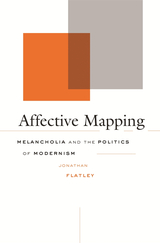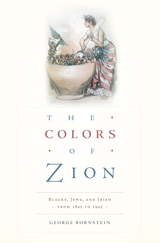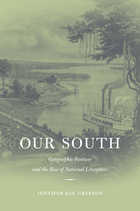
The surprising claim of this book is that dwelling on loss is not necessarily depressing. Instead, Jonathan Flatley argues, embracing melancholy can be a road back to contact with others and can lead people to productively remap their relationship to the world around them. Flatley demonstrates that a seemingly disparate set of modernist writers and thinkers showed how aesthetic activity can give us the means to comprehend and change our relation to loss.
The texts at the center of Flatley’s analysis—Henry James’s Turn of the Screw, W. E. B. Du Bois’s The Souls of Black Folk, and Andrei Platonov’s Chevengur—share with Freud an interest in understanding the depressing effects of difficult losses and with Walter Benjamin the hope that loss itself could become a means of connection and the basis for social transformation. For Du Bois, Platonov, and James, the focus on melancholy illuminates both the historical origins of subjective emotional life and a heretofore unarticulated community of melancholics. The affective maps they produce make possible the conversion of a depressive melancholia into a way to be interested in the world.

A major reevaluation of relationships among Blacks, Jews, and Irish in the years between the Irish Famine and the end of World War II, The Colors of Zion argues that the cooperative efforts and sympathies among these three groups, each persecuted and subjugated in its own way, was much greater than often acknowledged today. For the Black, Jewish, and Irish writers, poets, musicians, and politicians at the center of this transatlantic study, a sense of shared wrongs inspired repeated outpourings of sympathy. If what they have to say now surprises us, it is because our current constructions of interracial and ethnic relations have overemphasized conflict and division. As George Bornstein says in his Introduction, he chooses “to let the principals speak for themselves.”
While acknowledging past conflicts and tensions, Bornstein insists on recovering the “lost connections” through which these groups frequently defined their plights as well as their aspirations. In doing so, he examines a wide range of materials, including immigration laws, lynching, hostile race theorists, Nazis and Klansmen, discriminatory university practices, and Jewish publishing houses alongside popular plays like The Melting Pot and Abie’s Irish Rose, canonical novels like Ulysses and Daniel Deronda, music from slave spirituals to jazz, poetry, and early films such as The Jazz Singer. The models of brotherhood that extended beyond ethnocentrism a century ago, the author argues, might do so once again today, if only we bear them in mind. He also urges us to move beyond arbitrary and invidious categories of race and ethnicity.

Since the birth of the nation, we have turned to stories about the American South to narrate the rapid ascendency of the United States on the world stage. The idea of a cohesive South, different from yet integral to the United States, arose with the very formation of the nation itself. Its semitropical climate, plantation production, and heterogeneous population once defined the New World from the perspective of Europe. By founding U.S. literature through opposition to the South, writers boldly asserted their nation to stand apart from the imperial world order.
Our South tracks the nation/South juxtaposition in U.S. literature from the founding to the turn of the twentieth century, through genres including travel writing, gothic and romance novels, geography textbooks, transcendentalist prose, and abolitionist address. Even as the southern states became peripheral to U.S. politics and economy, Jennifer Rae Greeson demonstrates that in literature the South remained central to the expanding and evolving idea of the nation.
Claiming the South as our deviant and recalcitrant “other,” Americans have projected an anti-imperial imperative of domesticating and civilizing, administering and integrating underdeveloped regions both within our borders and beyond. Our South has been a primal site for thinking about geography and power in the United States.
READERS
Browse our collection.
PUBLISHERS
See BiblioVault's publisher services.
STUDENT SERVICES
Files for college accessibility offices.
UChicago Accessibility Resources
home | accessibility | search | about | contact us
BiblioVault ® 2001 - 2024
The University of Chicago Press









